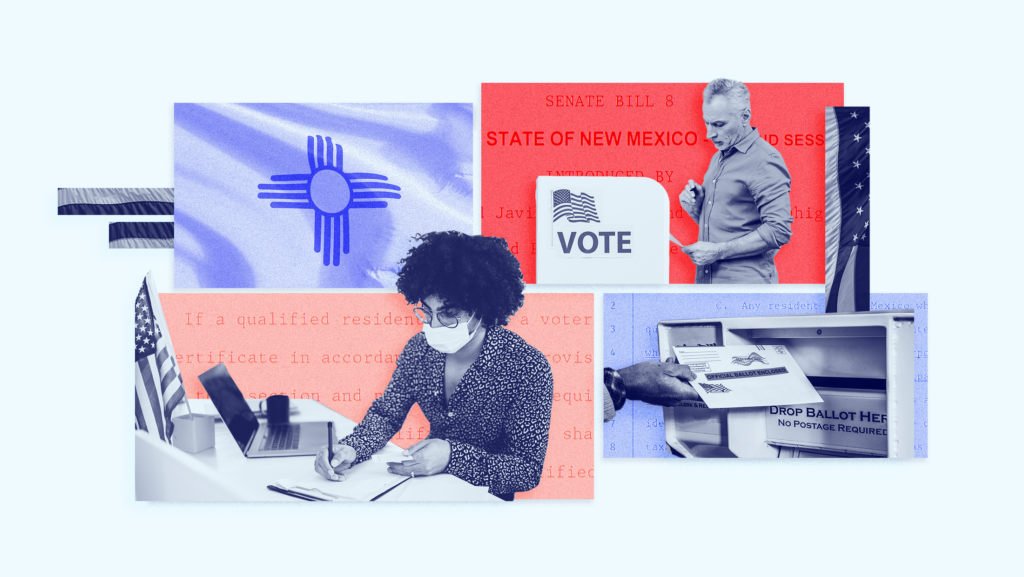New Mexico Is Leading on Voting Rights as Federal Push Stalls

Federal voting rights legislation has stalled and with little chance of it ever passing during this current Congress, the nation is now looking to the states to protect and expand our most fundamental rights.
In New Mexico, we have long been a national model for protecting voter access and deploying innovative election security solutions. Our use of all-paper ballots for every election, air-gapped counting systems and mandatory post-election audits are a national standard. We also make it easy for eligible voters to make their voices heard, with two weeks of early voting, same-day voter registration, secured ballot drop boxes and many more pro-voter innovations. But the work to strengthen our democracy is never finished and this year, during our legislative session that’s now underway, we’re again forging ahead with a comprehensive set of voting rights reforms as the national prospects on these policies falter.
Making it efficient for eligible voters to access the ballot is a cornerstone of how I approach election administration in New Mexico as the state’s chief election officer. Policies that help eligible voters make their voices heard, however, have come under brutal attack recently across the nation. Instead of seeking to increase voter registration, some states are making the process harder. Instead of expanding the options, voters have to cast their ballots, some states are limiting early voting days or the use of secured ballot drop boxes. Instead of building on the things that worked in 2020, like the expanded use of vote-by-mail that so many voters found convenient, some states are clamping down.
Of all the reforms proposed in the New Mexico Voting Rights Act, backend AVR has the potential to reach and register the most eligible voters.
The set of reforms I’m working with our legislature to pass this year, known as the New Mexico Voting Rights Act, will significantly expand ballot access while further securing our state’s elections and creating more efficiencies for election administrators.
The Act includes proposals to make Election Day a state holiday, expand online voter registration opportunities, improve ballot access for Native voters, more efficiently restore voting rights for formerly incarcerated individuals and much more.
Expanding our existing automatic voter registration (AVR) system in New Mexico is another key proposal. We’re looking to implement what’s known as “back-end AVR” here in New Mexico. Back-end AVR is the nationally-recognized gold standard for voter registration and would improve what’s already a winning AVR policy here in New Mexico. Backend AVR would allow our state’s elected officials to automatically verify motor vehicle division customers’ voting eligibility and add them to voter rolls — all while maintaining complete control for potential registrants by sending them a postcard in the mail to decline registration, select their preferred language or even choose a party affiliation.
Of all the reforms proposed in the New Mexico Voting Rights Act, backend AVR has the potential to reach and register the most eligible voters. Backend is efficient, secure, and accurate and could more than double the turnout effect of New Mexico’s current Motor Vehicle Division (MVD) registration system, expand AVR to agencies outside the MVD (such as Medicaid) that reach more diverse voters, and save New Mexico as much as $350,000 per election. Through backend AVR, New Mexico will be able to register far more eligible voters than the current system and, in a state that ranks 42nd in the country for voter registration rates, this upgrade would ensure that the estimated 473,000 unregistered eligible New Mexicans have the opportunity to participate in future elections. Additionally, with backend AVR, over 85% of eligible voters who pass through covered state agencies would be registered to vote or have their registrations updated.
To round out the cost-saving benefits and ability to reach more eligible voters, backend AVR will make New Mexico’s voter rolls more equitable. Backend AVR is proven to register more young voters, more voters of color and more voters with low incomes than the existing systems. Backend AVR will also ensure that eligible, formerly incarcerated New Mexicans are automatically registered to vote through the MVD or Medicaid, and registers and preregisters young voters much more efficiently than the current system. A backend AVR upgrade is a commonsense, next step to make New Mexico’s elections more efficient, accurate and secure for all eligible New Mexicans.
After a 2020 election in which 40% of all votes in our state were cast by mail, our need to make such a voting option permanent could also not be clearer. Creating a permanent absentee voter list – another key aspect of the Act – will ensure that any voter can sign up to automatically receive a ballot by mail for an election in which they’re eligible to vote. Under our current system, eligible voters can request a mail ballot, but must repeatedly do so for each election. Automating this process, as both California and Arizona already have, won’t just make life a little more convenient for New Mexico voters, it will ensure that voters with disabilities, older voters, and even voters with busy schedules don’t need to worry about requesting a mail ballot for every election — they can just wait for theirs to arrive in the mailbox.
With the New Mexico Voting Rights Act our state lawmakers now have an opportunity to show the whole country that even amid attacks on voting rights elsewhere, New Mexico is a place where democracy thrives.
Maggie Toulouse Oliver is New Mexico’s 26th Secretary of State. She has served the people of New Mexico in this role since first being elected in 2016.